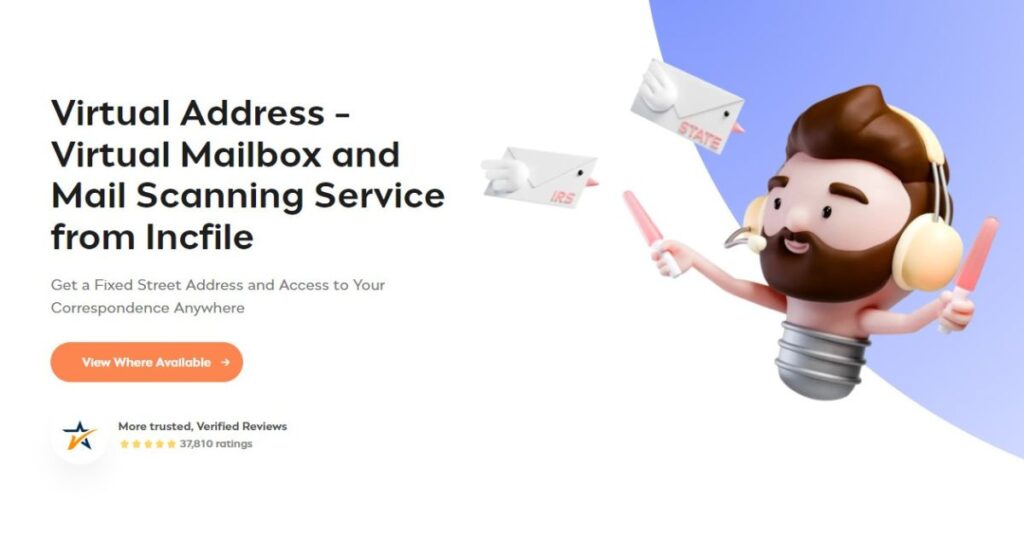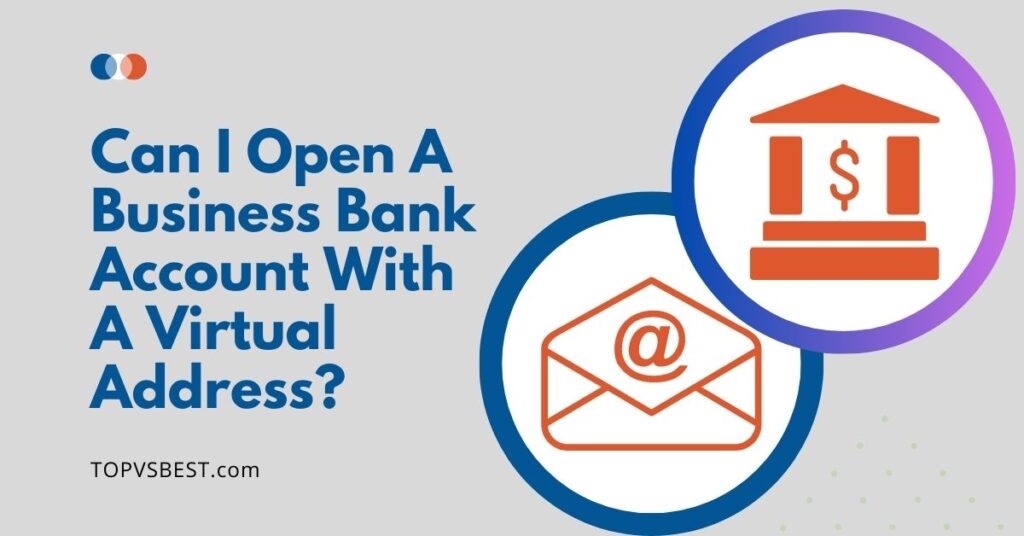Overview
In today’s digital age, businesses embrace virtual solutions to streamline operations and enhance flexibility.
One such innovation is the concept of a virtual address for business purposes. This alternative to traditional physical addresses has raised questions among entrepreneurs, particularly when it comes to opening a business bank account.
This blog post will answer the question, “Can I open a business bank account with a virtual address?”
We will discuss the feasibility of opening a business bank account without a physical address, explore the banks that accept virtual addresses, and shed light on the benefits and limitations of this modern approach.
Whether you are a startup entrepreneur or a seasoned business owner, understanding the potential of virtual addresses in the banking world is crucial for maximizing your financial efficiency.
What Is A Virtual Business Address?

A virtual address, despite its name, is actually a physical address. It refers to a real, physical location where mail and packages are received on behalf of a business or individual.
The term “virtual” comes into play because the address’s management and communication are conducted digitally. Instead of physically visiting the location, the recipient can access and view their mail online through a secure portal.
So, a virtual address for a business is a digital mailing address that allows companies to receive and manage mail online without needing physical office space.
Combining a physical mailing address and digital management offers businesses and individuals a flexible and convenient solution for handling mail without needing a traditional brick-and-mortar office.
Advantages And Limitations Of Using A Virtual Address For Business Purposes
Using a virtual address for business goals offers several advantages.
Firstly, it eliminates the constraints of a physical location, making it ideal for remote or online-based enterprises.
Secondly, virtual addresses help maintain privacy and security, as sensitive mail is stored digitally and can only be accessed by authorized personnel.
However, it’s essential to note that some government agencies and financial institutions may have specific requirements for physical addresses, which could pose limitations for certain business activities.

How To Open A Business Bank Account Without Physical Address
A physical address is required to open a bank account, and the bank will keep it on record. However, after opening the account, you can change the address associated with statements and debit/credit cards to a virtual or mailing address.
Some US banks accept foreign physical addresses but require opening the account in person with supporting documents.
Compliance with Know Your Customer (KYC) and Anti-Money Laundering (AML) regulations necessitates a physical address for account opening.
Virtual online-only businesses are not recognized; either a sole proprietorship requires your address, or other business entities need a registered street address.
Some banks may not require your physical presence when opening an account. That can be useful if you are located abroad but doing business locally. Here are a few steps to consider:
- Virtual Address: Consider using a virtual address service that provides a physical mailing address for your business. While the address is physical, the management of mail is done digitally, allowing you to access and handle correspondence online.
- Online Banks: Look for online banks that may be more lenient regarding physical address requirements. Some online banks cater to businesses that operate primarily in the digital realm and may have more flexible address verification processes.
- Business Incubators/Coworking Spaces: Some business incubators or coworking spaces offer mailing services and may allow you to use their address as your business address. Check if such services are available in your area.
- Home Address: If you run a home-based business, you can consider using your residential address for the bank account. However, be sure to check with the bank to ensure they accept this arrangement.
- Business Mailbox: Rent a business mailbox at a local post office or a private mailbox provider. This way, you can use the mailbox address for your bank account and keep your home address private.
- Use a Registered Agent: In some jurisdictions, you can use a registered agent’s address for official business purposes. A registered agent is a third-party service that accepts legal and official documents on behalf of your business.
- Contact Banks Directly: Reach out to different banks and explain your situation. Some banks may have alternative address verification methods or be willing to work with you on a case-by-case basis.
As we already mentioned, keep in mind that banks have strict Know Your Customer (KYC) and Anti-Money Laundering (AML) regulations to follow, which may require a physical address for account opening.
Therefore, while these options may offer some flexibility, it is essential to communicate openly with the bank and provide any additional documentation they may request to satisfy their regulatory requirements.
Steps For Opening A Bank Account Using A Virtual Address
- To use a virtual address for opening a bank account, start by registering your business to obtain the virtual address.
- Provide necessary personal information and address verification to activate the service.
- Once registered, you’ll receive a virtual office address, which can be used as your business address while keeping your personal address private.
- Gather relevant documents, such as a certificate of incorporation, to verify the virtual address as your business address.
- Choose a bank and open a business account, submitting the necessary documents to verify your business address. This process allows you to utilize a virtual address for your business and establish a bank account efficiently.

Banks That Accept Virtual Addresses
Before opening a business bank account with a virtual address, it is crucial to understand each bank’s specific criteria and requirements.
Some banks may require additional documentation to verify the authenticity and legitimacy of the virtual address and the business entity. Meeting these criteria ensures a smooth and successful account opening process.
Generally, banks accept virtual addresses as long as they are genuine street addresses that can be accessed.
You can use a virtual mailbox for various business purposes, including incorporating your business, filing documents, and opening bank accounts while ensuring your privacy.
However, federal banking regulations, mandated by the FDIC, require banks to obtain identification and a physical address for all customers to prevent money-related crimes.
Therefore, businesses must have a valid physical address, and mailbox addresses, PO Boxes, and registered agent addresses are not considered acceptable for a business bank account.
Entrepreneurs seeking banks that accept virtual addresses can start by researching and comparing different financial institutions.
Online resources, official bank websites, and consultations with bank representatives can provide valuable information about their policies regarding virtual addresses. Being well-informed will facilitate the selection of the most suitable bank for a business’s banking needs.

Virtual Address For LLC And Other Business Entities
LLCs using virtual addresses for their business operations should be aware of any specific state and federal regulations that govern the use of virtual addresses. Different states may have varying requirements and restrictions for LLCs, which may influence the acceptability of virtual addresses for official business purposes.
Understanding State And Federal Regulations
Before opting for a virtual address, LLCs must thoroughly research and understand the regulations imposed by the state where they are registered. Additionally, they should be aware of any federal mail handling and privacy regulations, as compliance is crucial for a smooth business operation.
What Is The Best Address To Use For An LLC?
It is advisable to avoid using your home address as your LLC address to maintain a clear separation between personal and business activities.
Mixing the two addresses may lead to potential complications. Instead, consider leasing a physical office space with a distinct address to serve as the official address for your LLC. This approach ensures a proper distinction between your personal and business affairs.
Virtual addresses offer various advantages for different business structures, including LLCs. They enable businesses to establish a professional presence, manage mail efficiently, and maintain privacy.
Virtual addresses can be a cost-effective solution for LLCs that operate remotely or lack a physical office.

How To Start A Virtual Address Business
To create a virtual address for your LLC, follow these five steps:
- First, choose a reputable virtual address provider with a reliable track record and positive customer reviews. For instance, Bizee provides virtual address services to assist businesses in setting up and managing their virtual addresses efficiently.
- Next, select a suitable plan based on your LLC’s mail volume and specific needs.
- Third, provide the necessary legal documentation to verify your LLC’s existence and compliance.
- Fourth, designate the preferred mailing location, which will serve as your LLC’s official address.
- Finally, manage your mail through the provider’s platform, where you can utilize mail forwarding or digital scanning options. For more detailed information on how to create a virtual address, read the in-depth blog post on our website.
Can I Open A Business Bank Account With A Virtual Address – FAQs
Yes, typically, you need a physical address for a business bank account. Most banks require a physical address as part of the verification process when opening a business bank account.
The acceptability of a virtual address for a business bank account depends on the bank’s policies. Some banks are open to virtual addresses, while others may require a physical presence during account opening. It’s crucial to research and identify banks that accommodate virtual addresses for business accounts.
Businesses can use either a physical address or if accepted by the bank, a virtual address for their business bank account. The choice depends on the bank’s requirements and the business’s preferences and needs.
While some banks accept virtual mailboxes as valid addresses for a business bank account, not all may do so. It’s essential to confirm with the specific bank and ensure compliance with their policies.
Some banks accept PO Box addresses for business accounts, while others may have restrictions. Business owners should inquire with individual banks to determine their PO Box address policy.
Usually, there is a fee for the virtual address services. The cost of a virtual address for a business account varies depending on the service provider and the level of features required.
Conclusion
This comprehensive blog post has provided valuable insights into utilizing a virtual address to fulfill business banking requirements.
We thoroughly examined the feasibility of opening a business bank account without the need for a physical address, shedding light on the potential options and requirements involved in this process.
Additionally, we explored the practical reality of banks’ policies of accepting virtual addresses, offering businesses greater flexibility in managing their financial affairs.
Moreover, we delved into the benefits of this modern approach, emphasizing the privacy and convenience it offers in maintaining a clear distinction between personal and business activities.
However, we also acknowledged the limitations imposed by federal banking regulations, which necessitate the availability of a valid physical address for account verification purposes.
By thoroughly covering these aspects, this blog post has provided readers with a well-rounded understanding of the virtual address concept and its significance in modern business banking practices.


